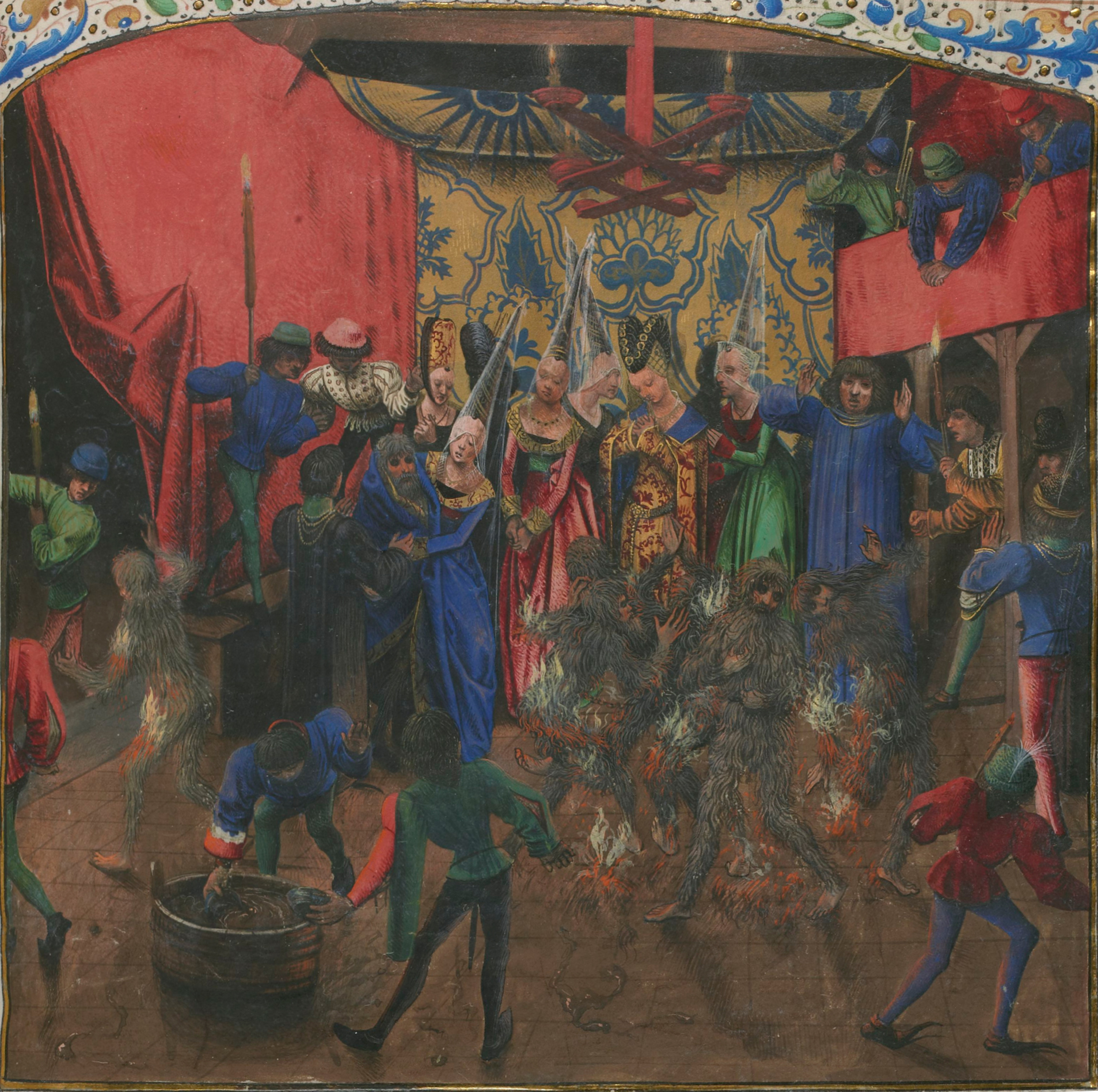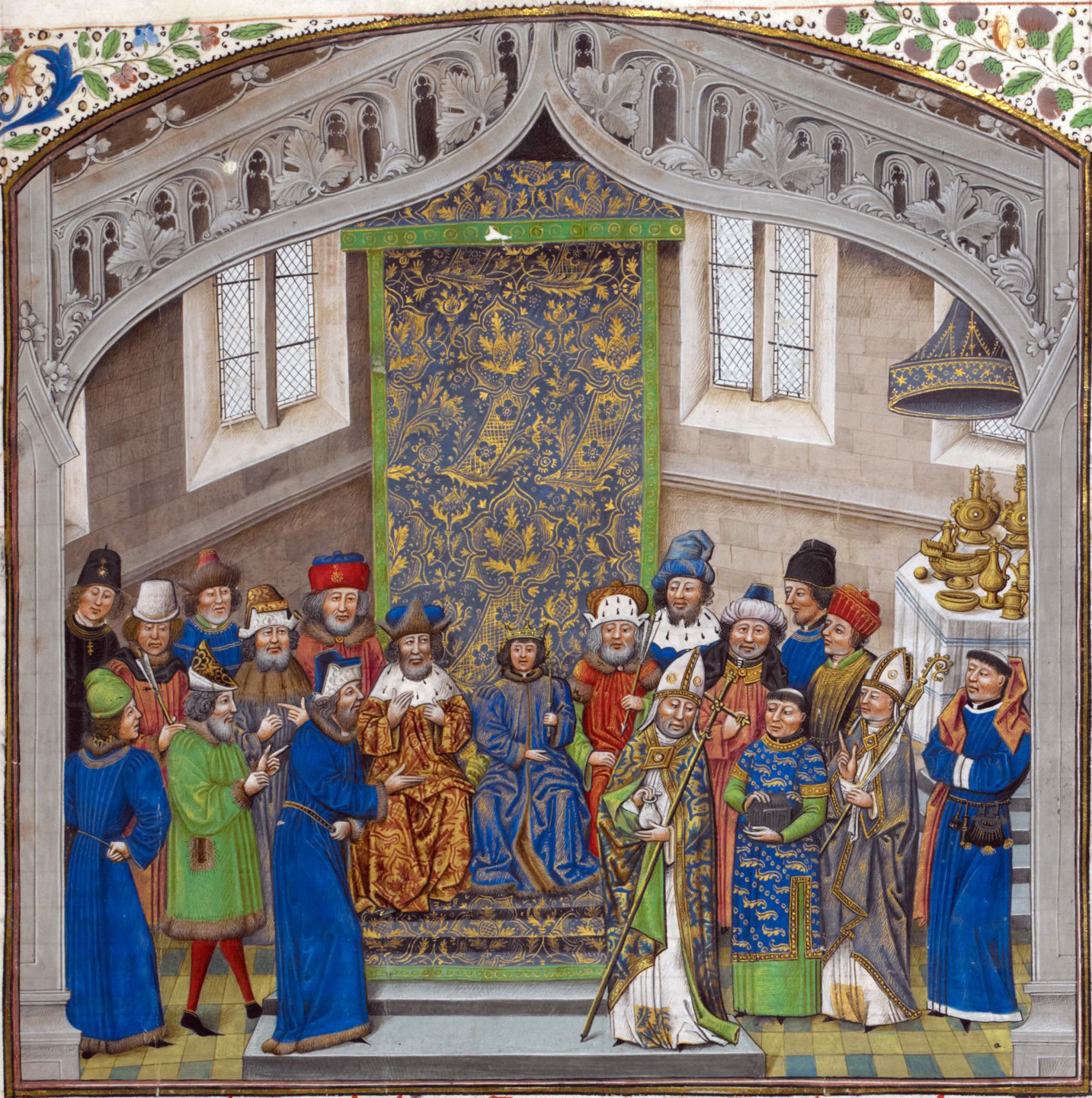|
Froissart's Chronicles
Froissart's ''Chronicles'' (or ''Chroniques'') are a prose history of the Hundred Years' War written in the 14th century by Jean Froissart. The ''Chronicles'' open with the events leading up to the deposition of Edward II in 1326, and cover the period up to 1400, recounting events in western Europe, mainly in England, France, Scotland, the Low Countries and the Iberian Peninsula, although at times also mentioning other countries and regions such as Italy, Germany, Ireland, the Balkans, Cyprus, Turkey and North Africa. For centuries the ''Chronicles'' have been recognized as the chief expression of the chivalric culture of 14th-century England and France. Froissart's work is perceived as being of vital importance to informed understandings of the European 14th century, particularly of the Hundred Years' War. But modern historians also recognize that the ''Chronicles'' have many shortcomings as a historical source: they contain erroneous dates, have misplaced geography, give inac ... [...More Info...] [...Related Items...] OR: [Wikipedia] [Google] [Baidu] |
John, Duke Of Berry
John of Berry or John the Magnificent (French: ''Jean de Berry'', ; 30 November 1340 – 15 June 1416) was Duke of Berry and Auvergne and Count of Poitiers and Montpensier. He was Regent of France during the minority of his nephew 1380-1388. His brothers were King Charles V of France, Duke Louis I of Anjou and Duke Philip the Bold of Burgundy. John is primarily remembered as a collector of the important illuminated manuscripts and other works of art commissioned by him, such as the '' Très Riches Heures''. His personal motto was ''Le temps venra'' ("the time will come"). Biography John was born at the castle of Vincennes on 30 November 1340, the third son of King John II of France and Bonne of Luxembourg. In 1356, he was made Count of Poitou by his father, and in 1358 he was named king's lieutenant of Auvergne, Languedoc, Périgord, and Poitou to administer those regions in his father's name while the king was a captive of the English. When Poitiers was ceded to Englan ... [...More Info...] [...Related Items...] OR: [Wikipedia] [Google] [Baidu] |
Benefice
A benefice () or living is a reward received in exchange for services rendered and as a retainer for future services. The Roman Empire used the Latin term as a benefit to an individual from the Empire for services rendered. Its use was adopted by the Western Church in the Carolingian Era as a benefit bestowed by the crown or church officials. A benefice specifically from a church is called a precaria (pl. ''precariae)'', such as a stipend, and one from a monarch or nobleman is usually called a fief. A benefice is distinct from an allod, in that an allod is property owned outright, not bestowed by a higher authority. Roman Catholic Church Roman imperial origins In ancient Rome a ''benefice'' was a gift of land ( precaria) for life as a reward for services rendered, originally, to the state. The word comes from the Latin noun ''beneficium'', meaning "benefit". Carolingian Era In the 8th century, using their position as Mayor of the Palace, Charles Martel, Carloman I and P ... [...More Info...] [...Related Items...] OR: [Wikipedia] [Google] [Baidu] |
Holy Roman Empire
The Holy Roman Empire was a political entity in Western, Central, and Southern Europe that developed during the Early Middle Ages and continued until its dissolution in 1806 during the Napoleonic Wars. From the accession of Otto I in 962 until the twelfth century, the Empire was the most powerful monarchy in Europe. Andrew Holt characterizes it as "perhaps the most powerful European state of the Middle Ages". The functioning of government depended on the harmonic cooperation (dubbed ''consensual rulership'' by Bernd Schneidmüller) between monarch and vassals but this harmony was disturbed during the Salian period. The empire reached the apex of territorial expansion and power under the House of Hohenstaufen in the mid-thirteenth century, but overextending led to partial collapse. On 25 December 800, Pope Leo III crowned the Frankish king Charlemagne as emperor, reviving the title in Western Europe, more than three centuries after the fall of the earlier ancient Weste ... [...More Info...] [...Related Items...] OR: [Wikipedia] [Google] [Baidu] |
County Of Hainaut
The County of Hainaut (french: Comté de Hainaut; nl, Graafschap Henegouwen; la, comitatus hanoniensis), sometimes spelled Hainault, was a territorial lordship within the medieval Holy Roman Empire that straddled what is now the border of Belgium and France. Its most important towns included Mons ( nl, Bergen), now in Belgium, and Valenciennes, now in France. The core of the county was named after the river Haine. It stretched southeast to include the '' Avesnois'' region and southwest to the Selle (Scheldt tributary). In the Middle Ages, it also gained control of part of the original ''pagus'' of Brabant to its north and the ''pagus'' of Oosterbant to the east, but they were not part of the old ''pagus'' of Hainaut. In modern terms, the original core of Hainaut consisted of the central part of the Belgian province of Hainaut, and the eastern part of the French ''département'' of Nord (the arrondissements of Avesnes-sur-Helpe and Valenciennes). Hainaut already appeared i ... [...More Info...] [...Related Items...] OR: [Wikipedia] [Google] [Baidu] |
Valenciennes
Valenciennes (, also , , ; nl, label=also Dutch, Valencijn; pcd, Valincyinnes or ; la, Valentianae) is a commune in the Nord department, Hauts-de-France, France. It lies on the Scheldt () river. Although the city and region experienced a steady population decline between 1975 and 1990, it has since rebounded. The 1999 census recorded that the population of the commune of Valenciennes was 41,278, and that of the metropolitan area was 399,677. History Before 1500 Valenciennes is first mentioned in 693 in a legal document written by Clovis II (''Valentiana''). In the 843 Treaty of Verdun, it was made a neutral city between Neustria and the Austrasia. Later in the 9th century the region was overrun by the Normans, and in 881 the town passed to them. In 923 it passed to the Duchy of Lower Lotharingia dependent on the Holy Roman Empire. Once the Empire of the Franks was established, the city began to develop, though the archaeological record has still not revealed all it ha ... [...More Info...] [...Related Items...] OR: [Wikipedia] [Google] [Baidu] |
The Dukes Of Berry And Burgundy Departing From Paris To Meet With The Duke Of Bretagne
''The'' () is a grammatical article in English, denoting persons or things already mentioned, under discussion, implied or otherwise presumed familiar to listeners, readers, or speakers. It is the definite article in English. ''The'' is the most frequently used word in the English language; studies and analyses of texts have found it to account for seven percent of all printed English-language words. It is derived from gendered articles in Old English which combined in Middle English and now has a single form used with pronouns of any gender. The word can be used with both singular and plural nouns, and with a noun that starts with any letter. This is different from many other languages, which have different forms of the definite article for different genders or numbers. Pronunciation In most dialects, "the" is pronounced as (with the voiced dental fricative followed by a schwa) when followed by a consonant sound, and as (homophone of pronoun ''thee'') when followed by a ... [...More Info...] [...Related Items...] OR: [Wikipedia] [Google] [Baidu] |
Robert Gaguin
Robert Gaguin (older spelling: ''Robert Guaguin''; winter of 1433/34 – May 22, 1501) was a noted French Renaissance humanist and philosopher; he was minister general of the Trinitarian Order. Biography He was born at Calonne-sur-la-Lys near Béthune in what was the county of Flanders and the Duchy of Burgundy. He and his brother Christophe lost their father at an early age, and his mother placed him in the Trinitarian convent of Préavin, where he began his studies. He later attended the University of Paris. He was an influential humanist who was a friend of Publio Fausto Andrelini from Forlì, an associate of Erasmus and a student of Gregory Tifernas.Encyclopædia Britannica, ''Humanism, The French humanists'', 2008 O.Ed. In his later years, he published a reformation of the statues of the Trinitarian Order on August 30, 1497. He died in Paris on May 22, 1501, at the age of 67, and was interred at the church of the convent of the Trinitarians. He also translated sever ... [...More Info...] [...Related Items...] OR: [Wikipedia] [Google] [Baidu] |
Jean De Wavrin
Jean de Waurin or Wavrin (c. 1400c. 1474) was a medieval French chronicler and compiler, also a soldier and politician. He belonged to a noble family of Artois, and witnessed the Battle of Agincourt from the French side, but later fought on the Anglo-Burgundian side in the later stages of the Hundred Years' War. As a historian, he put together the first chronicle intended as a complete history of England, very extensive but largely undigested and uncritical."Jean de Wavrin"in ''Medieval France; in Encyclopedia Written in French, in its second version it extends from 688 to 1471, though the added later period covering the Wars of the Roses shows a strong bias towards Burgundy's Yorkist allies. Strictly his subject is Great Britain, but essentially only England is covered, with a good deal on French and Burgundian events as well. Life He was illegitimate, the son of Robert de Wavrin, Lord of Wavrin, a town in France near the present Belgian border, and Michielle de Croix. His fa ... [...More Info...] [...Related Items...] OR: [Wikipedia] [Google] [Baidu] |
Enguerrand De Monstrelet
Enguerrand de Monstrelet (c. 140020 July 1453) was a French chronicler. He was born in Picardy, most likely into a family of the minor nobility. Life In 1436 and later he held the office of lieutenant of the ''gavenier'' (i.e. receiver of the ''gave'', a kind of church rate) at Cambrai, and he seems to have made this city his usual place of residence. He was for some time bailiff of the cathedral chapter and then provost of Cambrai.Wijsman, Hann1600_ History in Transition. Enguerrand de Monstrelet’s Chronique in Manuscript and Print (c. 1450-c. 1600) Academia.edu. Retrieved July 23, 2012 He was married and left some children when he died. Little else is known about Monstrelet except that he was present, not at the capture of Joan of Arc, but at her subsequent interrogation with Philip the Good, Duke of Burgundy. Continuing the work of Froissart, Monstrelet wrote a ''Chronique'', which extends to two books and covers the period between 1400 and 1444, when, according to anothe ... [...More Info...] [...Related Items...] OR: [Wikipedia] [Google] [Baidu] |
Villein
A villein, otherwise known as ''cottar'' or '' crofter'', is a serf tied to the land in the feudal system. Villeins had more rights and social status than those in slavery, but were under a number of legal restrictions which differentiated them from the freeman. Etymology Villein was a term used in the feudal system to denote a peasant (tenant farmer) who was legally tied to a lord of the manor – a villein in gross – or in the case of a villein regardant to a manor. Villeins occupied the social space between a free peasant (or "freeman") and a slave. The majority of medieval European peasants were villeins. An alternative term is serf, despite this originating from the Latin , meaning "slave". A villein was thus a bonded tenant, so he could not leave the land without the landowner's consent. Villein is derived from Late Latin ''villanus'', meaning a man employed at a Roman villa rustica, or large agricultural estate. The system of tied serfdom originates fr ... [...More Info...] [...Related Items...] OR: [Wikipedia] [Google] [Baidu] |




.jpg)
.png)


